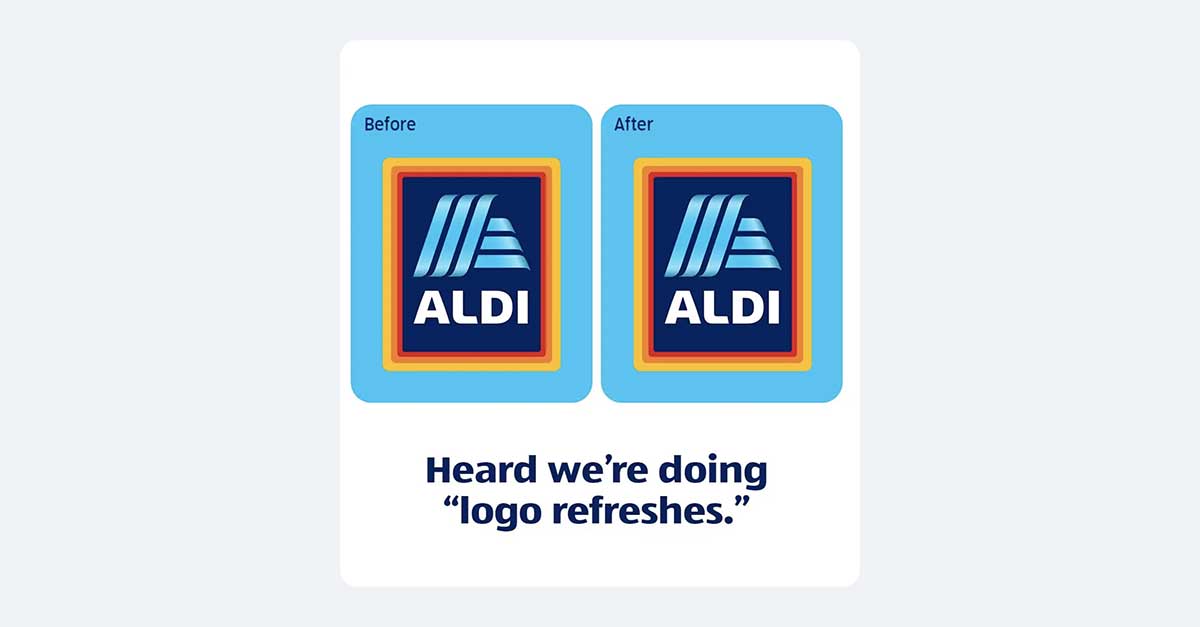For highly visible brands, a refreshed identity can signal something deeper, and truly significant. For Walmart, de-emphasizing the name in favor of a more streamlined and contemporary look reinforces the retailer’s ongoing evolution from physical shopping destination to a universal source for all things—a brick-and-mortar-plus-digital powerhouse that goes head-to-head against competitors such as Amazon.
It’s been entertaining to catch up on the social buzz around the launch of Walmart’s new identity. From the haters to a bit of teasing from competitors like Aldi, it’s certainly grabbing attention!

Having been involved in many large rebranding programs over my career—and being acquainted with the team that did the identity that is the basis of this update—it’s interesting to look at the “before” and “after” and think about what it means for the company going forward. The team at Walmart is framing the new identity as a big launch. I’m inclined to agree.
Change can be consequential, in a good way
The last change to the Walmart brand—the launch of the sunburst logo and a fresh look roughly 20 years ago—was a huge change for the company. In a time when everything around us seems instant, the scale of refreshing a brand like Walmart is noteworthy. Just getting the 80,000 trailers repainted probably took years!

That rebrand recast Walmart’s image, moving it from stodgy shopping experience to a much more vibrant (even fun) expression. That was a big shift, and proved to be a key driver of massive growth over the past two decades. It showed the power of a new identity to reach new audiences and expand the scope of the business.
This time, the rebrand reflects Walmart’s pivot to digital
With this new refresh, something not being discussed much is the new symbol, which no longer has the word Walmart locked up to it, on applications such as walmart.com. On the surface it seems subtle, but there’s real meaning behind it.
The beauty of moving away from the name is multifaceted. From an identity standpoint, the company is laying claim to its symbol and creating a shorthand for its brand promise. Only a lucky few can achieve this: Mastercard, with its two-circles-only logo, Apple and Nike spring to mind. The ability to de-emphasize, or even delete, the name is a fantastic opportunity that only the most recognized brands can claim. A simpler, more streamlined visual identity performs better in the digital environment across devices and experiences, reflecting the way today’s consumers prefer to engage.

It’s not just about retail sales anymore
I see another major benefit that’s not being talked about at all. Retail media! The rise of retail media is quietly reshaping the e-commerce landscape, and this relatively new space is worth billions to Walmart beyond product sales. Forecasts by the end of 2026 for Walmart’s retail media network exceed $6 billion in ad sale revenue. Walmart’s new brand identity is key to success in this high-growth, highly competitive market.
In retail media, advertisers buy ad placement on e-commerce sites and other high-traffic channels—and in the case of Walmart, even in-store. From Walmart’s perspective, the strategy and refreshed identity clearly play to its advantage. By de-emphasizing the Walmart name and raising the profile of advertisers, Walmart becomes a prime (pun intended!) destination for consumers to discover products and services. Creating a neutral e-commerce identity helps drive both ad spending and retail sales—an enormous revenue opportunity.
Unpacking Walmart’s new identity reveals that it’s about much more than putting on a fresh new face. What might feel like a subtle change in design reflects big, strategic moves that will drive exponential growth and opportunity for the company as it continues its dominance as the world’s largest retailer.



